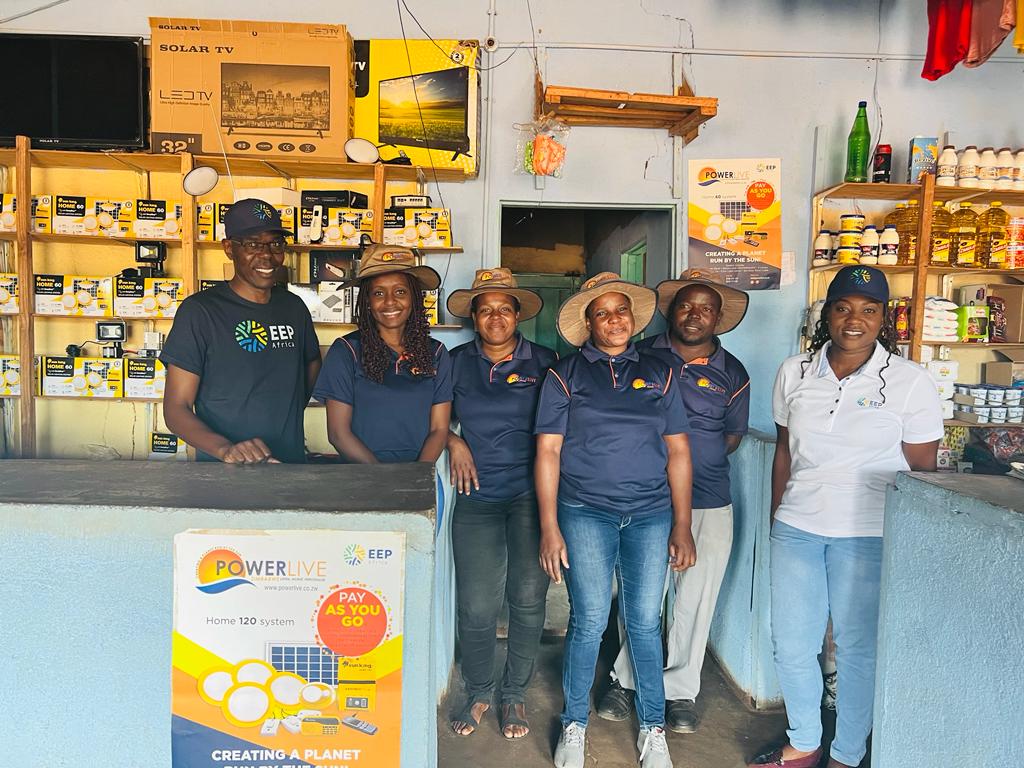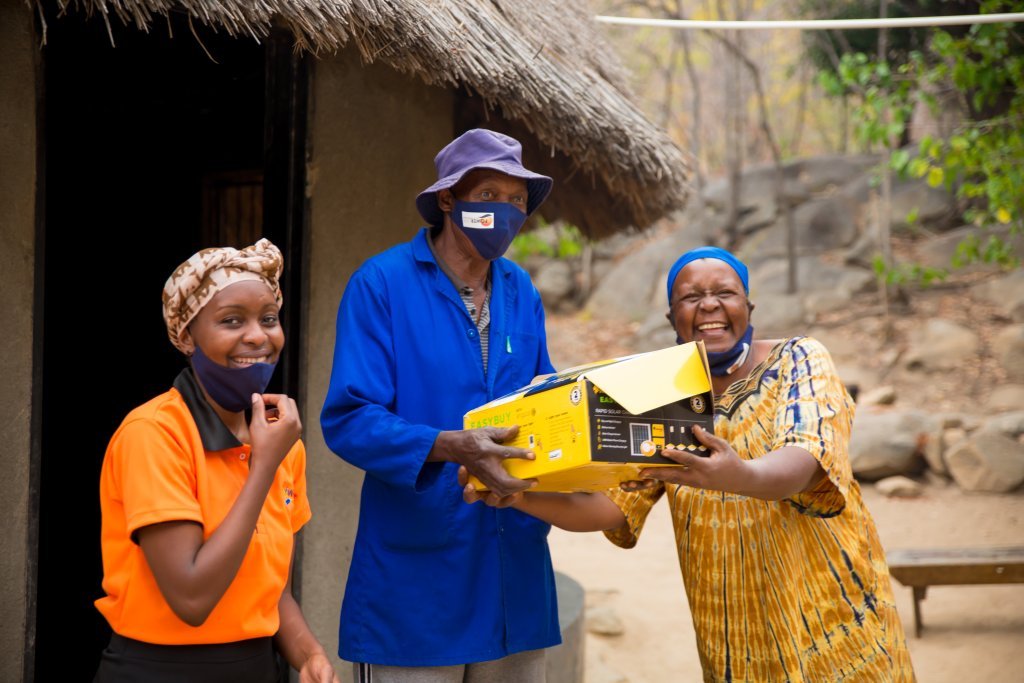Women-led start-up in Zimbabwe changes lives in rural communities
To mark this year’s International Women’s Day we showcase Powerlive, a women-led initiative that provides solar energy and internet access to rural communities in Zimbabwe while supporting women-run businesses.
Access to electricity in Zimbabwe is greatly restricted. According to the World Bank, of a population of 15.9 million, only 52.7% have access to energy, and of the people living in rural areas—which makes up 68% of the population—only 37.1% have access, leaving most people in these communities cut off from power.
In these off-grid communities, not having access to energy has a range of impacts—from limiting basic activities such as having household appliances, to a lack of access to communication technologies. It has repercussions on children’s education as they cannot do their homework after dark because of limited light. It also poses safety and health risks as kerosene lamps or candles can cause fire accidents and exposure to indoor air pollution. For women in the domestic space, the lack of electricity also means less usable hours to dedicate for generating additional income, thus curtailing their economic empowerment and decision-making power at home.

Sharon Yeti, CEO and co-founder of Powerlive (second from left) with the Powerlive team and representatives from EEP Africa at a distribution center in Mhondoro-Bumbe. Women comprise 85% of sales representatives and technicians at Powerlive, as well as 75% of the head office staff in Harare, Zvimba, and Zvishavane. Photo: Powerlive Zimbabwe.
Powerlive provides sustainable solutions while closing the digital gender gap
To combat the lack of access to electricity, Powerlive was set up in 2018 to provide clean, safe and affordable modular solar home systems to off-grid households, small-scale farmers and schools in the rural and peri-urban areas of Zimbabwe. With financing since 2020 from the Energy and Environment Partnership Trust Fund (EEP Africa)—a clean energy financing facility hosted and managed by NDF—this initiative has equipped over 4,000 rural households with solar energy.
The approach is simple: customers purchase a solar modular package for a small deposit and continue making payments for the next 18 months while already using it. “This Pay as You Go (PAYG) model enables households to invest in solar energy, but also leaves them with enough funds for other responsibilities, such as school fees and food for the family,” explains Sharon Yeti, CEO and co-founder of Powerlive.
Crucially, women are at the center of Powerlive’s business model, both as consumers of sustainable energy and as internet users in a digital world that continues to exclude women, girls and other marginalized groups.
According to UN Women, which has set this year’s International Women’s Day theme as “DigitAll: Innovation and Technology for Gender Equality,” today, 63% of women have access to the internet, compared to 69% of men. And women are 12% less likely to own a mobile phone. In an effort to close this digital gender gap and address the gender disparity in mobile phone ownership, all Powerlive solar packages come with a 4G smartphone and monthly data allowance, providing women from off-grid areas access to connectivity.
Women grow their businesses through solar-powered energy
For Caroline Matemara, a Powerlive sales agent and now business-owner from the Mhondoro-Mubaira district, having electricity and the technologies it facilitates has saved time and money. “The change was immediate. We used to pay to charge our phones at the shops, which are 5km away. Now we can charge our phones at home and can frequently communicate with friends, family and customers as well as the Powerlive team.”
The impact in her family’s daily routine has also been significant. “My school-aged girls wake up between 4:00 and 5:00 in the morning to get ready for school and the lights enable them to see. They leave early because they must walk. Previously, we would go to sleep as early as 6:00 P.M. because the candles were not that bright, and we could not do much. With the lights, my girls can now do their homework, and their grades have improved. We are also able to spend more time together at night and I can do my sewing work that I cannot do during the day.”
Similarly, for Elizabeth Jane Kasamba, a small-scale farmer from the Domboshava district, having electricity has meant no longer having to walk 1km just to fetch water for her farm and home, thanks to the solar water pump and four solar module systems she has purchased. “The pigpens would stay dirty because there was not enough water to clean them,” she explains. “Now, we can wash the pigs and the pigpens as well as the fowl runs. The workload has reduced because of the pump, and I have gained more income from my livestock.”
These improvements have allowed Elizabeth to have big plans for her farm. Her aim is to significantly grow her livestock by going from three to 1,000 cows, from 80 to 2,000 pigs, from 2,800 farmed fish per quarter to 6,000, and to increase chicken sales from 1,000 to 5,000 a month. She is also planning to introduce new livestock to her farm: “I also want to have goats.”

Powerlive customers receiving their solar product. The product packages available vary in watt power and supporting accessories, such as types of lamps or the inclusion of a TV. Scalable products, such as water pumps, radios and electric hair clippers are also available. Photo: Powerlive Zimbabwe.
Showing that change is possible
Securing financing for and kicking off women-led projects in the male dominated sector of solar energy has been challenging. But, investing in climate solutions with women at the center not only diminishes theirs and other marginalized groups’ increased vulnerability to the climate crisis, but also improves outcomes for climate-related projects and policies on a whole.
Recalling the beginnings of Powerlive, back in 2018, Sharon shares, “At first, when we presented our vision and products to the communities, we weren’t taken seriously by the men of households, and some women either. It was difficult for me as a leader because I didn’t have a lot of women role models in this sector in Zimbabwe to look up to. It took a lot of persistence.” And this persistence paid off. In 2021, an international jury of experts selected Powerlive as the 2021 EEP Africa Start-Up Project of the Year for its gender approach to energy access in a difficult market.
EEP Africa financing concluded in 2022 and Powerlive now plans to secure additional funding to reach even more rural communities that don’t have electricity. Scaling up means installing more distribution centers, increasing sales agents, and developing business support initiatives for the women who want to pursue their own projects. Continuing to equip both customers and employees with financial literacy trainings, market linkages and mentorship opportunities is also important work that will carry forward. For Sharon and the Powerlive team, the life-changing impacts that solar energy has had on thousands of women, like Caroline and Elizabeth, means they are on the right track: “We’ve been able to say to women, not with words, but through the communities looking at us, that change is possible.”
